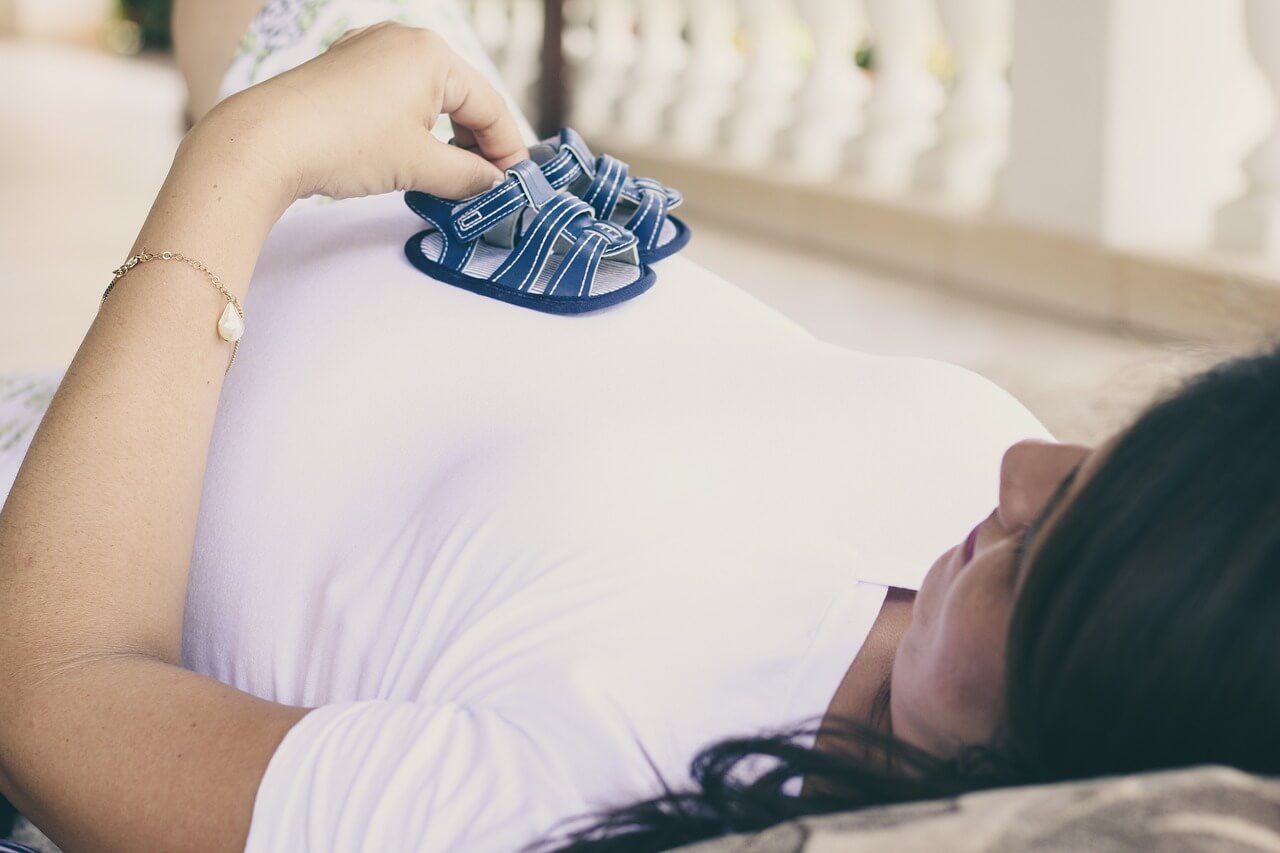Symptoms of yeast infection during pregnancy are a frequent concern for most pregnant women.
In the world of women, we find that every woman searches for everything related to her beauty and elegance to save her time and does not care during this journey to search for and pay attention to another part of her body, which is the vagina.
Some women may be exposed to fungal attacks during pregnancy, which are what we call symptoms of yeast infection during pregnancy, and the reason is due to the increase in this hormone, which forms part of every woman’s femininity, which is estrogen.

What does estrogen do in a woman's body?
The production of estrogen increases during pregnancy, and estrogen works to develop the sexual characteristics of the fetus.
This hormone is one of the factors that help in the appearance of symptoms of yeast infection during pregnancy for most women due to its high levels, which cause uncomfortable itching and are accompanied by symptoms that should not be underestimated.
Hormonal changes cause vaginal itching, which in turn affects the pH balance in the vagina. This leads to vaginal dryness and sweating, which causes uncontrollable itching.
It is one of the symptoms of yeast infection during pregnancy, which affects about 75% of women throughout their lives. Perhaps you suffered from it one day, or perhaps you are feeling it now (unfortunately!). This itching is accompanied by a thick, white, cottage cheese-like discharge.
This article is a roadmap through which we will guide you through everything you need to know about the symptoms of yeast infection during pregnancy—their causes, how to spot symptoms, safe treatment options, and tips to reduce the risks.
How do yeast infections occur during pregnancy?
Your body contains small amounts of single-celled fungi called Candida albicans that live in mucous membranes, such as the mouth, stomach, intestines, and vagina.
The high level of estrogen in your body during pregnancy throws off the natural balance of yeast and bacteria in the vagina. Therefore, a large percentage (20–30%) of women suffer from symptoms of yeast infection during pregnancy. This creates a more favorable climate for yeast to grow and colonize the vagina.
The reason for this is its connection to the factor H protein found on the surface of the cells that causes vulvovaginal candidiasis. This type of yeast (also known as candidiasis) is usually harmless but is widespread among most pregnant women.
Many studies have also proven that genetics plays a role in some women being more susceptible to symptoms of yeast infection during pregnancy than others.
Mutations in many genes interfere with the immune system's ability to defend against Candida yeast, leading to recurring infections in some people. This inherited predisposition is called familial candidiasis.
Yeast infections occur at any time but are most common during the second trimester of pregnancy. If you notice signs or symptoms of yeast infection during pregnancy, talk to your doctor, even if you've had one before.
It has been observed that some serious infections have symptoms similar to yeast infections, so your doctor will perform a simple fungal swap in the clinic to check for the presence of yeast.
Symptoms of yeast infection that most women may notice
- Itchy sensation
- Burning sensation
- Swelling or redness in the vulva area, which is the area outside the vagina.
- The appearance of thick white vaginal discharge resembling cottage cheese.
Some precautions that help avoid symptoms of yeast infection during pregnancy include:
After using the toilet, dry the area from front to back.
Avoid anything that has a fragrant smell, including tampons, sanitary pads, and daily pads.
Change tampons, sanitary pads, and daily pads frequently.
Help this area breathe by wearing cotton underwear to promote airflow.
Do not use a vaginal douche, which removes healthy vaginal bacteria that prevent infection.
If you have diabetes or gestational diabetes, try to follow and manage this.
Replace sweaty workout clothes and wet swimsuits immediately after completing activities.
Avoid very hot baths and hot tubs.
Wear loose clothing.
How do you treat yeast infections during pregnancy?
Treatments vary based on the nature of the condition, but there is no need to worry as yeast infections are harmless. However, do not expect the symptoms to appear and disappear independently, as it sometimes requires antifungal medications to stop the infection.
Medications are usually oral, topical, or administered via a vaginal suppository.
Vaginal suppositories and topical creams are safe options for every woman to treat symptoms of yeast infection during pregnancy and are also recommended during breastfeeding.
Some medications available may not require a prescription, such as miconazole, clotrimazole, and terconazole, all of which effectively eliminate the symptoms of yeast infection during pregnancy safely and effectively. It is usually applied for three to seven days.
Therefore, it is important not to neglect or not complete treatment to prevent the recurrence of the infection, as studies have shown that taking these medications is safe for every woman during pregnancy.
But this does not mean not being careful when taking some oral medications, such as the oral medication Diflucan (Fluconazole), during pregnancy.
Despite the simplicity and ease of taking medications orally and not taking many measures when using them other than vaginal suppositories and creams, some studies have indicated the danger of taking fluconazole because of its bad effects that threaten every pregnant woman and expose her to an increased risk of miscarriage and exposing the fetus to birth defects or stillbirth. especially when taking high doses over long periods of pregnancy.
However, this does not mean that it is difficult to use some natural materials to eliminate the symptoms of yeast infection during pregnancy. Here are some tips from materials available in your home.

How do you get restful sleep with a yeast infection?
Many women ask about the best way to sleep with a yeast infection. In some cases, symptoms of yeast infection during pregnancy cause irritability and sleep disturbances, which three out of every four women are likely to experience at some point in their lives.
Pain in the vagina is one of the most common symptoms, in addition to the appearance of some other signs such as itching or burning and pain during urination and sexual intercourse.
Despite the discomfort that you may feel while sleeping with the symptoms of yeast infection during pregnancy, you can follow these tips for a healthy and peaceful sleep:
Maintain a healthy sleep routine
Sleep at fixed times, do not stay up late, and make sure your bedroom is cool, dark, and quiet.
Manage stress
Try to relax through deep breathing or meditation. Stay away from stress, which exacerbates symptoms and makes sleeping more difficult.
If symptoms of yeast infection during pregnancy are severe or don't improve: Consult a doctor. If itching is severe, interferes with sleep significantly, or doesn't improve with home remedies, it's important to see a doctor to ensure proper diagnosis and treatment.
Some tips for getting better sleep:
- Reduce consumption of sugar and processed foods.
- Wear loose, breathable cotton underwear and clothing.
- Avoid wearing wet clothes or swimwear for a long period.
- Avoid antibiotics without necessity and a prescription.
- Avoid vaginal douching without consulting a doctor.
- Avoid using vaginal deodorant sprays and scented vaginal lotions.
- Eat a healthy and balanced diet.
- Maintaining general body hygiene

What are the cases in which one should immediately go to the doctor?
Many women wonder when to worry about vaginal itching. If you are one of those women who face difficulties related to vaginal itching, do not hesitate to see your doctor if your body does not respond to treating the symptoms of yeast infection during pregnancy, especially if you notice the following:
The symptoms do not improve or worsen after several days of treatment.
You noticed a return of the vaginal infection after treatment.
You notice new symptoms during or after treatment.
If you suffer from different types of vaginal infections during pregnancy,.
If you notice that the secretions change color and become yellow, green, red, gray, or have an unpleasant odor.
Overall, symptoms of yeast infection during pregnancy are common due to hormonal changes. Symptoms include itching, burning, redness, and discharge. It is important to visit a doctor for diagnosis and treatment, especially before using medication.
Some home remedies, such as yogurt, tea tree oil, and garlic, may help treat the symptoms of yeast infection during pregnancy, but you should consult a doctor first. Maintaining good hygiene and avoiding irritants can help prevent infection.


You must be logged in to post a comment.